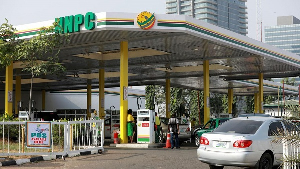Nigeria owes its state-owned oil company almost half of what it plans to collect in revenues this year for a gasoline subsidy it reintroduced in August.
Nigerian National Petroleum Corp. is owed 7.8 trillion naira ($4.9 billion) by the government in subsidy debts for the seven-months to July, according to NNPC’s Chief Financial Officer Umar Ajiya. The government aims to collect 19.4 trillion naira in revenue this year.
The subsidy that was withdrawn in May last year by Nigeria’s President Bola Tinubu to help repair the state’s finances after debt-service costs jumped to 96% of revenues was reinstated to allow measures to be introduced that could cushion Nigerians from spiraling inflation that’s at 33%.
The government will allow NNPC to offset about 2.2 trillion naira it owes the state against the subsidy debt, Ajiya said in an interview after the company announced its results in Abuja, the capital.
The government accumulated the debt to the NNPC because it is the sole importer of gasoline, which it resells to marketers at below market cost to keep prices low. A liter of fuel sells for about 617 naira at the pump at NNPC retail stations in Lagos, the commercial capital, compared with more than a 1,000 naira in neighboring countries, fueling cross-border smuggling of the product.
The state-oil company recorded an annual profit of 3.3 trillion naira in 2023, compared with 2.55 trillion naira a year earlier. It plans to invest $6.6 billion in its operations this year, which will be largely borrowed, Ajiya said.
It foresees crude and condensates production increasing to 2 million barrels a day by year end from an average of 1.75 million barrels per day in August, helped by improved security to combat oil theft, said Oritsemeyiwa Eyesan, executive vice president of the company’s upstream division.
Business News of Tuesday, 20 August 2024
Source: bloomberg.com
Nigeria owes state oil firm $4.9 billion fuel-subsidy debt
 Nigeria owes its state-owned oil company almost half of what it plans to collect in revenues in 2024
Nigeria owes its state-owned oil company almost half of what it plans to collect in revenues in 2024
















